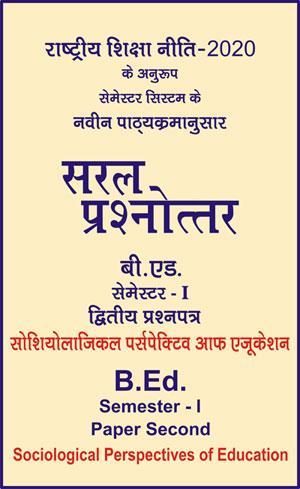|
बी एड - एम एड >> बी.एड. सेमेस्टर-1 प्रश्नपत्र-II - सोशियोलाजिकल पर्सपेक्टिव आफ एजूकेशन बी.एड. सेमेस्टर-1 प्रश्नपत्र-II - सोशियोलाजिकल पर्सपेक्टिव आफ एजूकेशनसरल प्रश्नोत्तर समूह
|
5 पाठक हैं |
|||||||
बी.एड. सेमेस्टर-1 प्रश्नपत्र-II - सोशियोलाजिकल पर्सपेक्टिव आफ एजूकेशन (अंग्रेजी भाषा मे)
Question- What provisions have been made in revised National of Education Policy 1992 for Secondary Education.
Ans.
Revised Policy Changes
Janardhan Reddy Committee on NPE Revision, suggested the following in NPE 1986.
-
National system of Education : The 10 + 2 + 3 educational system has been accepted in national system of education now it became the common structure of education. Further break of first 10 years
(i) 5 year primary education (ii) 3 years upper primary
(iii) and 2 years of High School, efforts will be made to have +2 stages accepted as a part of school education through-out the country. -
Primary Education : The new thrust in elementary education will have two aspects :
(i) Universal enrolment and universal retention of children up to 14 years of age and
(ii) A substantial improvement in the of quality of education.
This will emphasis three aspects :
(i) Universal access and enrolment
(ii) Universal retention of children up to 14 years of age and
(iii) A substantial improvement in the of quality of education to enable all children to achieve essential levels of learning. -
Vocationalisation : Janardhan committee reviewed vocationalization in this way it is purposed that vocational courses cover 10 percent of higher secondary students by 1995 and 25 percent by 2000. Steps will be taken to see that a substantial majority of the products of vocational courses are employed or become self-employed. Review of the courses offered would be regularly undertaken. Government will also review its recruitment policy to encourage diversification at the secondary level.
-
A Resolve : In the policy of 1986 a resolve was written in these words. The NPE will give the higher priority to solving the problems of children dropping out of school and will adopt an array of meticulously formulated strategies based on micro planning and applied at the grass roots level all over the country ensure children retention at school. This effort will be fully coordinated with the network of now formal education. It shall be ensured that all children who attain the age of about 11 years by 1990 will have five years of schooling or its equivalent through the non-formal stream like-wise by 1945 all children will be provided free, and compulsory education up to 14 years of age.
The above has been reviewed by Janardhan committee in the following words. “The education policy will give the highest priority to solving the problem of children dropping out of school and will adopt an array of meticulously formulated strategies based on micro planning and applied at the grass root level all over the country. To ensure children's retention at school. This effort will be fully coordinated with the net work of non-formal education. It shall be ensured that free and compulsory education of satisfactory qualities provided to all children up to 14 years of age before he went enter the twenty first century. A national mission will be launched for the achievement of this goal.
5. Universal Education : The Committee has given suggestions to for free and universal education of the children of the country.
The Reddy committee suggested to find out the extent to which this measure of universalisation of primary education has been achieved in each state of the country. If any state has failed in this respect the needed help by the Central Govt. should be provided to the state concerned in this matter. The committee has recommended the following to the state concerned in this matter. The committee has recommended the following :
(i) The girls of the scheduled and tribal class people should be compulsorily sent to school.
(ii) It has also been said that within a radius of one kilometer there must be at least one primary school if not more.
(iii) Special provision must be made for transport of children of primary schools. Which exist near helps dense forests and rivers and other types of impediments for going and coming back homes.
(iv) The enrolment of children in primary school should be raised up by adopting special measures like persuasions and physical support for transport.
(v) The drop-out levels of 60 percent of this classes should be brought to above 40 to 45 percent.
(vi) The operation Black-Board policy should be adopted in each and every area for educating as many children as possible.
(vii) In educational planning of the universal education the aim and adult education should be contained also whatever such a combination is possible. In adult education programmes special attention should be given on education of illiterate woman of scheduled and tribal people.
6. Adult Education : The Reddy Committee of 1992 accepted in total the programme of total literacy campaign (T.L.C.) and recommended that in each 5th years plan scheme should be incorporated for implemention.
7. The Secondary Education : National policy of education should be revised for making secondary education job, oriented.
(i) Special provision should be made to include computer operational training in all schools.
(ii) Like Indira Gandhi open university some secondary schools may also be organized as open school education to receive education up to the secondary education level at least.
|
|||||














